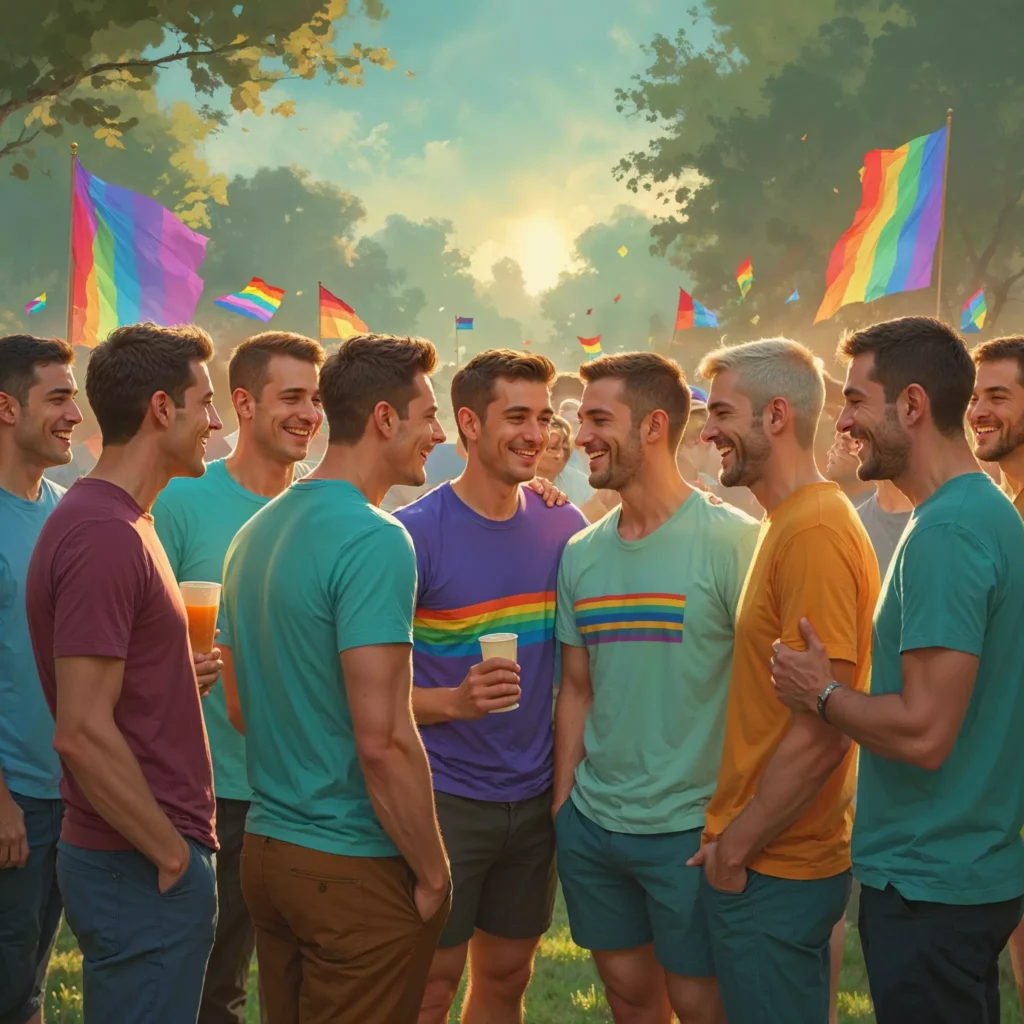Table of Contents
I am Mrs Gutenberg GPT and here is ‘The gutenberg html’
You’ve seen it — that delicate dance at the bar, the brunch, the housewarming. Two exes laughing just close enough to prove they’re fine, just distant enough to show they’ve “moved on.” In queer circles, especially among gay men, this choreography is everywhere. We stay friends with our exes not just because we’re mature — but because, sometimes, we can’t afford not to be. For many, gay men post-breakup friendship isn’t just emotional; it’s social survival.

The Need for Continuity
For many gay men, staying friends after a breakup is an act of community preservation. The queer community, while vast online, often feels small and deeply intertwined in real life. You share spaces, friends, even exes of exes. Losing one person can mean losing access to that entire shared microcosm — the group chats, the game nights, the comfort of being “in.”
Research echoes this reality. Sociologist Aino Lahti (2020) found that queer breakups ripple through more than just the couple — they shake chosen families and support networks that act as lifelines. So when a relationship ends, staying friends isn’t just emotional; it’s logistical. It’s about protecting identity continuity — the sense that your social self, your place in the community, remains intact.

Exes as Friends: Miracle or Fantasy?
Let’s examine Exes as Friends in: Why we want it, if it’s healthy, too soon maybe, friends with benefits, setting boundaries & the friendship fantasy.
Tap here to read more →The Benefits of Staying Close
When it’s done with care, gay men post-breakup friendship can be a stabilizing force. It can ease transitions, preserve friend groups, and protect emotional safety in spaces where queer men often already feel watched, judged, or replaceable. There’s a sense of emotional maturity in being able to say, “We didn’t work out romantically, but I still want good things for you.”
Griffith et al. (2017) found that friendships rooted in security or practical reasons — like shared networks or mutual respect — tend to result in healthier post-breakup outcomes. It makes sense: when both men approach the friendship as an evolution rather than a continuation, it can deepen emotional intelligence and show others that queer love doesn’t have to turn to ash once the passion burns out.
There’s also a subtle solidarity in maintaining those bonds. In a culture that too often trivializes gay relationships, staying friends can be a quiet statement: “We were real. We mattered. And we can still hold grace for each other.”
The Blind Spots We Miss
But there’s a fine line between grace and avoidance. Between staying friends to protect your peace — and staying friends to protect your denial. Research warns that when post-breakup contact stems from unresolved attraction or fear of social exile, healing gets stuck in limbo. You might find yourself orbiting each other — liking posts, texting late at night, running into each other at every event — never quite together, never quite apart.
Communication scholar Lannutti (2002) discovered that shared friend groups don’t guarantee healthy dynamics. It’s not where you overlap but how you redefine the connection. Without boundaries, emotional leakage happens — jealousy, guilt, and that quiet wish to be chosen again. And in tight-knit queer networks, those leaks can spread fast.
Finding the Middle Path
So what does healthy friendship after love look like? It’s when you can see your ex at a friend’s birthday and genuinely hope he’s happy. When you no longer need to monitor who he’s dating. When staying friends feels like an honest choice, not an emotional safety net.
The trick is remembering that friendship isn’t the default continuation of love — it’s a new form entirely. It needs space, boundaries, and mutual consent to grow into something authentic. Sometimes the bravest thing isn’t staying friends — it’s taking time apart so that, one day, you can be.

Closing Reflection
Maybe that’s what healing looks like in our community — not cutting ties, but reweaving them. Learning that you can still share space without sharing history. That love can transform without dissolving. In the end, gay men post-breakup friendship isn’t a myth or a miracle. It’s a delicate balancing act — a way of saying, “I still belong here, even if I no longer belong to you.”
FAQ
Q1. Why do gay men often stay friends after a breakup?
Many gay men remain friends with their exes to preserve harmony in overlapping queer networks and chosen families, avoiding social isolation within smaller community spaces.
Q2. What are the benefits of gay men post-breakup friendship?
It provides emotional stability, shared support networks, and smoother reintegration into community life, fostering maturity and mutual respect.
Q3. What are the emotional risks of staying friends with an ex?
Blurred boundaries and delayed emotional closure can keep both partners stuck in unprocessed feelings or dependency, especially if motivated by fear or attraction.
Q4. How can gay men set healthy boundaries when staying friends with an ex?
By taking space post-breakup, clarifying emotional intentions, and communicating limits openly—ensuring the friendship is built on healing, not avoidance.
Scientific Sources
-
Griffith, R. L., Gillath, O., Zhao, X., & Martinez, R. (2017): Staying friends with ex-romantic partners: Predictors, reasons, and outcomes
Key Finding: Identified four motivations for remaining friends with exes—Security, Practical, Civility, and Unresolved Romantic Desires—where friendships based on Security or Practical motives lead to healthier outcomes.
Why Relevant: Provides a psychological foundation for understanding why gay men might remain friends with exes for community security or practical social reasons.
https://onlinelibrary.wiley.com/doi/abs/10.1111/pere.12197 -
Lannutti, P. J. & Cameron, K. A. (2002): Beyond the breakup: Heterosexual and homosexual post-dissolutional relationships
Key Finding: Showed that post-breakup relationship quality is shaped more by dyadic variables like mutual liking and time since breakup than by shared social networks.
Why Relevant: Highlights that even within overlapping queer circles, emotional boundaries—not shared friends—determine whether post-breakup friendships are healthy.
https://doi.org/10.1080/01463370209385654 -
Lahti, A. (2020): LGBTIQ+ break-up assemblages: At the end of the rainbow
Key Finding: Found that queer breakups are intertwined with chosen family, minority stress, and communal identity; maintaining post-breakup ties supports belonging and social continuity.
Why Relevant: Directly ties to how gay men’s friendships with exes maintain identity continuity and protect connection within small, interlinked communities.
https://journals.sagepub.com/doi/10.1177/1440783320964545




Leave a Reply